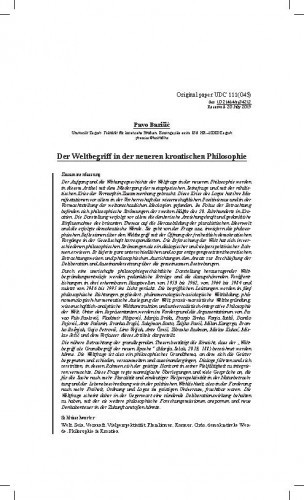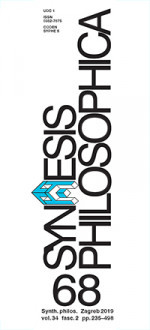Der Aufgang und die Wirkungsgeschichte der Weltfrage in der neueren Philosophie werden in diesem Artikel mit dem Niedergang der metaphysischen Seinsfrage und mit der nihilistischen Krise der Vernunft in Zusammenhang gebracht. Diese Krise des Logos hat ihre Manifestationen vor allem in der Vorherrschaft des wissenschaftlichen Positivismus und in der Vormachtstellung der weltanschaulichen Ideologien gefunden. Im Fokus der Betrachtung befinden sich philosophische Strömungen der zweiten Hälfte des 20. Jahrhunderts in Kroatien. Die Darstellung verfolgt vor allem die denkerische Anziehungskraft und gedankliche Einflussnahme des brisanten Themas auf die Herausbildung der pluralistischen Ideenwelt und die erfolgte demokratische Wende. Sie geht von der Frage aus, inwiefern die philosophischen Reflexionen über den Weltbegriff mit der Öffnung der freiheitlich-demokratischen Vorgänge in der Gesellschaft korrespondierten. Die Erforschung der Welt hat sich in verschiedenen philosophischen Strömungen als ein dialogischer und vielperspektivischer Rahmen erwiesen. Er lieferte ganz unterschiedlichen und sogar entgegengesetzten theoretischen Betrachtungsweisen und philosophischen Ausrichtungen den Ansatz zur Erschließung der Deliberation und Auseinandersetzung über die gemeinsamen Bestrebungen. Durch eine umrisshafte philosophiegeschichtliche Darstellung herausragender Weltbegründungsentwürfe werden gedankliche Erträge und die dazugehörenden Veröffentlichungen in drei erkennbaren Hauptwellen von 1953 bis 1962, von 1964 bis 1984 und zuletzt von 1986 bis 1995 ins Licht gerückt. Die begrifflichen Leistungen werden in fünf philosophische Richtungen gegliedert: phänomenologisch axiologische Weltbildung, phänomenologisch-hermeneutische Auslegung der Welt, praxis-marxistische Weltbegründung, wissenschaftlich analytische Weltkonstruktion und universalistisch-integrative Philosophie der Welt.; Uspon i dometi pitanja o svijetu u suvremenoj filozofiji dovode se u ovom članku u svezu sa zalaskom metafizičkoga pitanja o bitku i s nihilističkom krizom uma. Ta kriza logosa manifestirala se, prije svega, u prevladavanju znanstvenoga pozitivizma i prevlasti svjetonazorskih ideologija. U žarištu razmatranja nalaze se filozofske struje druge polovice 20. stoljeća u Hrvatskoj. Prikaz prati u prvom redu političku privlačnost i misaoni utjecaj izazovne teme na oblikovanje pluralističkoga svijeta ideja i demokratski preokret koji je uslijedio. Razmatranje započinje pitanjem kako su filozofska promišljanja o pojmu svijeta odgovarala i poticala otvaranje procesa liberalne demokratizacije u društvu. Istraživanje svijeta pokazalo se dijaloškim i pluriperspektivističkim okvirom u različitim filozofskim strujama. On je dao poticaj i otvorio pristup promišljanju i raspravi o zajedničkim težnjama posve različitim, pa čak i suprotstavljenim teoretskim nazorima i filozofskim strujama. Sažeti filozofijsko-povijesni prikaz istaknutijih modela zasnivanja svijeta iznosi na vidjelo misaone prinose i odgovarajuće publikacije u tri glavna vala koji su prepoznatljivi od 1953. do 1962., od 1964. do 1984., te naposljetku od 1986. do 1995. Pojmovna postignuća razdijeljena su na pet filozofijskih pravaca: fenomenološko-aksiološko oblikovanje svijeta, fenomenološko-hermeneutičko tumačenje svijeta, praksističko- marksističko zasnivanje svijeta, znanstvenoanalitička konstrukcija svijeta i univerzalističko-integrativna filozofija svijeta. Od predstavnika razmatraju se argumentacije Pavla Vuk-Pavlovića, Vladimira Filipovića, Marije Bride, Franje Zenka, Vanje Sutlića, Danila Pejovića, Ante Pažanina, Branke Brujić, Sulejmana Boste, Željka Pavića, Milana Kangrge, Branka Bošnjaka, Gaje Petrovića, Line Veljaka, Ante Čovića, Zdravka Radmana, Mislava Kukoča, Mislava Ježića i autora ovoga članka.; This paper connects the rising and the impact of question about the world in modern philosophy with the decline of the metaphysical question of being and with the nihilistic crisis of mind. This crisis of the logos has found its manifestations above all in the predominance of scientific positivism and the supremacy of world-view-ideologies. In the focus of the examination are philosophical trends of the second half of the 20th century in Croatia. The depiction pursues in the foreground the political attraction and intellectual influence of the controversial topic on the emergence of the pluralistic world of ideas and the democratic turn. It starts with the question of how philosophical reflections on the concept of the world corresponded to the opening up of the liberal democratic processes in society. The exploration of the world has proved to be a dialogical and pluri-perspective framework in various philosophical currents. It gave very different and even opposite theoretical views and philosophical orientations on the approach to the deliberation and debate about the common aspirations. Through a sketchy philosophical-historical account of the outstanding concepts of reasoning about the world, the intellectual output and related publications are brought to light in three recognisable waves from 1953 to 1962, from 1964 to 1984 and most recently from 1986 to 1995. The conceptual achievements were divided into five philosophical directions – phenomenological-axiological world formation, phenomenological hermeneutic interpretation of the world, praxis-Marxist world foundation, scientific-analytical world construction and the universalistic-integrative philosophy of world.; La montée et l’impact de la question mondiale dans la philosophie moderne sont liés dans le présent article au déclin de la question métaphysique de l’être et à la crise nihiliste de la raison. Cette crise du logos s’est surtout manifestée par la prédominance du positivisme scientifique et la dictature des visions du monde idéologiques. Les tendances philosophiques de la seconde moitié du 20e siècle en Croatie sont au centre de nos considérations. Cette présentation se concentre, au premier plan, sur l’attraction politique et sur la manière dont la pensée intellectuelle de ce sujet controversé influence l’élaboration d’un monde d’idées pluralistes, mais également sur le tournant démocratique qui a suivi. Cela commence par la question de savoir comment les réflexions philosophiques sur le concept de monde correspondent à l’ouverture des processus de gouvernance populaire dans la société. L’exploration du monde s’est révélée être un cadre dialogique et pluri perspectiviste dans divers courants philosophiques. Il a encouragé des points de vue théoriques et des orientations philosophiques très différents, voire opposés, et leur a offert une approche pour la réflexion et la discussion sur les aspirations communes. À travers un compte-rendu philosophico-historique des modèles les plus éminents pour concevoir un monde, la production intellectuelle et les publications associées sont mises en lumière en trois grandes vagues identifiables de 1953 à 1962, de 1964 à 1984 et plus récemment de 1986 à 1995. Les acquis conceptuels ont été divisés en cinq directions philosophiques: la formation du monde phénoménologico-axiologique, l’interprétation phénoménologico-herméneutique du monde, le raisonnement sur le monde praxiste-marxiste, la construction du monde analyticoscientifique et la philosophie du monde universaliste intégratrice.
Sažetak

 Synthesis philosophica : 34,2(2019) / editor-in-chief Ante Čović.
Synthesis philosophica : 34,2(2019) / editor-in-chief Ante Čović.